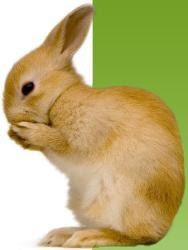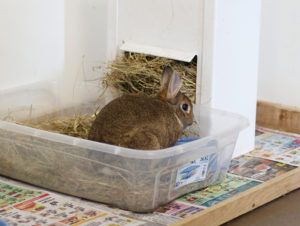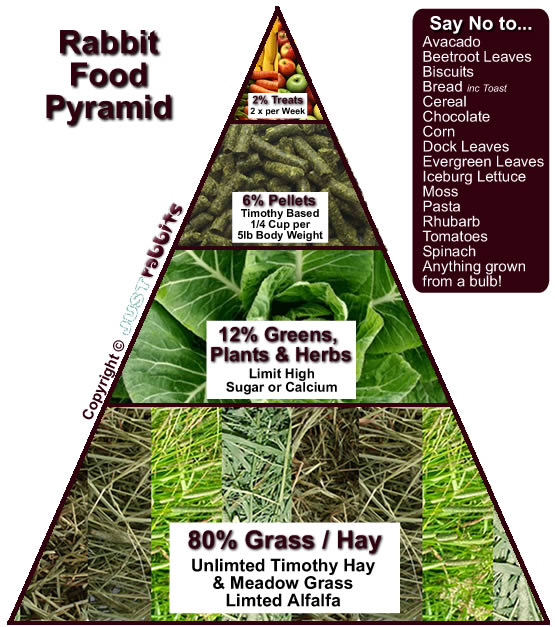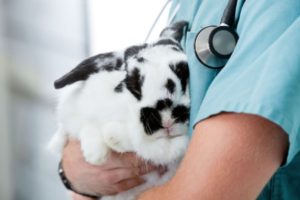Rabbits are much more social than people think. For generations, people have pictured rabbits outside in a backyard hutch, due to their habit of defecating whenever they feel the need. On the contrary, rabbits can be trained to use a litter box, just like a cat. This new revelation has brought the rabbit from being housed outside to being an indoor pet, giving owners more time to spend with their pet.
Housing
When keeping a rabbit inside, a cage is still an essential need. You should never leave a rabbit running loose in your house unattended. They are diggers and chewers, and they can get into all sorts of trouble when unsupervised. Portable pen-type cages are very popular due to the ease of cleaning and the ability to move them around. Whatever the setup you choose, remember that rabbits like to dig and chew so place the cage in a rabbit-proof area of your home and they must be kept at a comfortable temperature of about 50-80 degrees. If your cage has a grid in the bottom, be sure the grids are small enough so your rabbit’s foot does not get caught. Buying a large piece of linoleum to use under the cage can eliminate digging behavior and makes for easy cleaning. Rabbits also enjoy having a box to sleep and hide in as well as toys to play with. Some rabbits like tossing cardboard rolls, plastic cat toys, and even plastic soda bottles around. Each bunny is different so try different toys. Rabbits also need things to constantly chew on to keep their teeth from overgrowing.
a rabbit inside, a cage is still an essential need. You should never leave a rabbit running loose in your house unattended. They are diggers and chewers, and they can get into all sorts of trouble when unsupervised. Portable pen-type cages are very popular due to the ease of cleaning and the ability to move them around. Whatever the setup you choose, remember that rabbits like to dig and chew so place the cage in a rabbit-proof area of your home and they must be kept at a comfortable temperature of about 50-80 degrees. If your cage has a grid in the bottom, be sure the grids are small enough so your rabbit’s foot does not get caught. Buying a large piece of linoleum to use under the cage can eliminate digging behavior and makes for easy cleaning. Rabbits also enjoy having a box to sleep and hide in as well as toys to play with. Some rabbits like tossing cardboard rolls, plastic cat toys, and even plastic soda bottles around. Each bunny is different so try different toys. Rabbits also need things to constantly chew on to keep their teeth from overgrowing.
Litter Box Training
You should change the litter box 2-3 times a week, depending on the number of rabbits you keep. A very good litter out on the market is called Carefresh. It is a newspaper-based litter and very soft and absorbent. Carefresh is recommended over using regular cat litter as it is easily digested if the rabbit happens to eat it.
Feeding
There are man y false ideas about just what a rabbit should be fed. The diet we recommend here at our hospital is an unlimited quantity of fresh hay, ½ cup of pellets, and a small amount of fresh fruits and vegetables as a daily treat. The hay is essential because it is high in fiber and keeps the bunny’s digestive tract moving. Rabbits, like people, have different tastes and your bunny will let you know which type of hay he enjoys. One important side note to remember: alfalfa is like the “candy bar” of hays.
y false ideas about just what a rabbit should be fed. The diet we recommend here at our hospital is an unlimited quantity of fresh hay, ½ cup of pellets, and a small amount of fresh fruits and vegetables as a daily treat. The hay is essential because it is high in fiber and keeps the bunny’s digestive tract moving. Rabbits, like people, have different tastes and your bunny will let you know which type of hay he enjoys. One important side note to remember: alfalfa is like the “candy bar” of hays.
Veterinary Care
We recommend spaying or neutering your rabbit, not only to prevent him or her from reproducing but it has shown to help with how well your rabbit behaves. Female rabbits can also be prone to ovarian and uterine cancer. Usually these procedures can be done after the age of 4 months. If your rabbit shows any of the following signs of illness, contact us immediately: discharge from the eyes and nose, drooling, lack of energy, loss of appetite and weight, diarrhea or no droppings for more than 12 hours, trouble breathing, fur loss and red, swollen skin.



Comments are closed.